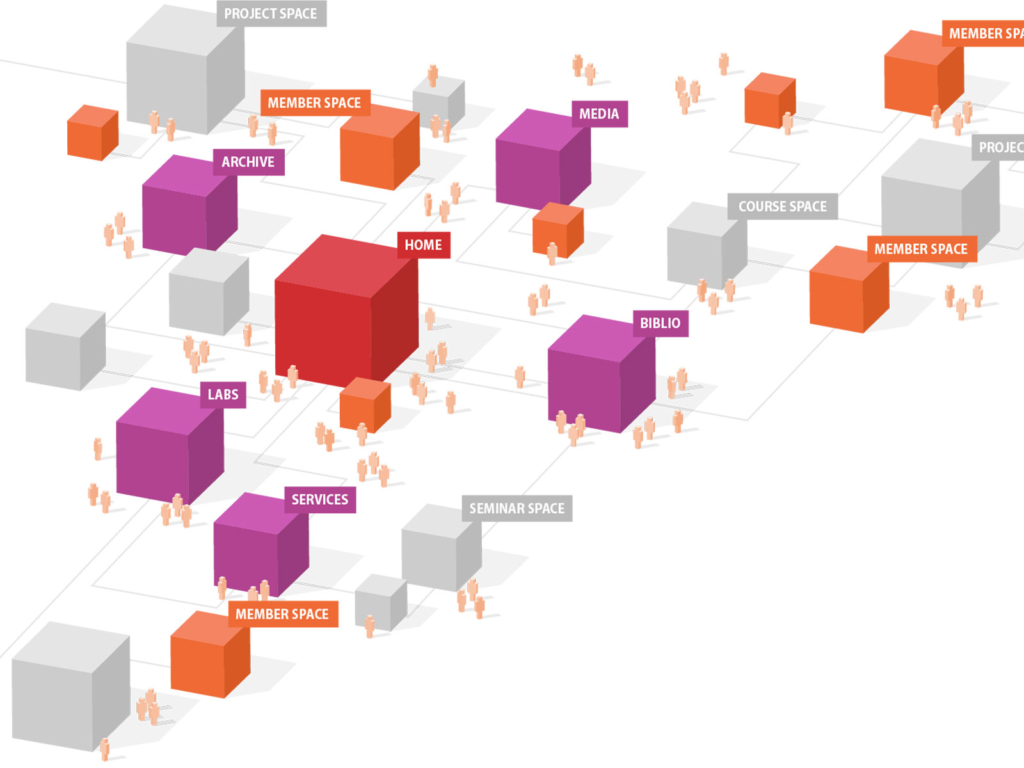Spaces is a Social Learning Environment (SLE) which has been developed by KISD – Köln International School of Design (Faculty of Cultural Studies, TH Köln, University of Applied Sciences) since 2008. It offers a communication platform, facilitates the organization of learning, and allows students to work together in a digital learning network. Students and teachers present their project, seminar or research work, share their research results, discuss online, and mutually support each other.
Digital open learning spaces enable new forms of learning
Spaces provides a student-centered digital learning environment for project-based and research learning. Students can organize their learning independently and learn together in a team. Each space serves as a virtual course representation and accompanies the participants during all project phases. Students and teachers have equal rights on Spaces and can create and manage digital learning rooms and their content. Spaces should be part of the students personal learning environment and should be used in an open, non-hierarchical, and unrestricted way.
Networked collaboration in the community
Spaces supports the development of a vibrant digital network of lectures and students. Through their activities, participans shape a community in which ideas, research results, project, seminar and research work can be presented, discussed, and documented. The platform allows students to document their learning process and to involve among and inspire each other. This openness is not just limited to the internal community of KISD. External cooperation partners such as international universities, organizations, and companies can also be added into Spaces and thus become part of the learning and research community. This creates an open collaboration environment in which hierarchical and static group boundaries dissolve and new social and collaboration networks emerge.
Mutual support of students
Each digital learning room in Spaces extend the feedback, reflection and support options of students. They do not have to present their activities exclusively in a physical space, but can initiate and present them independent of place and time online and receive feedback subsequently. In doing so, Spaces creates a flexible, but secure surrounding on which lectures, or peers can follow, support, and comment on current common learning activities.
Campus-wide communication on one platform
Lecturers, students, and employees can publish messages, tips, hints, questions or appointments in a central »stream« on the start page of Spaces. The Spaces community heavily uses this common social media feature. The homepage also provides insight into the ongoing activities in the individual digital course spaces. Students can view posts and comments immediately and thus can directly participate in the exchange and communication of the course. The Spaces homepage is the main information and contact point and, at the same time, a window into the current teaching and learning activities in the Spaces community.
Collaborative knowledge supports teaching and research
All actions initiated and performed in Spaces expand the digital knowledge base. Open data and exchange formats enable the flexible handling of data that can be accessed and managed in different, even external sources. Digital services such as an archive, a video platform and an online bibliography are offered in Spaces. The archive contains project, bachelor and master theses that are tagged and accessible for all members of the community. All recorded lectures and presentations are provided via the »Media« service. The »Biblio« service offers the easy integration of literature sources. All these services are integrated into Spaces and create a transparent, permeable and living knowledge base that accompanies and supports research, teaching, and learning.
Advanced digital profiles through the Study Journal
All members of the community have an individual profile as their virtual presence in the community. This digital profile represents a part of the learning biography of each user. Personal information, such as name, email, telephone, semester, links to the social network and other links are displayed and can easily be edited by the user. The profile page also shows the student’s “Study Journal”. This is an e-portfolio in which the students document their attended courses, reflect their personal study goals, and receive feedback from lecturers or peers. The Study Journal documents the individual learning of students and supports the development of a high-quality competence-oriented study profile. This fosters the collaboration within the Spaces community by highlighting both the personal and professional perspectives of each student.
Open source as a future development basis
Spaces is based on the open source weblog and publishing system WordPress. Building on this, a social learning environment was created with numerous self-developed plugins and themes. WordPress is very easy to deploy and extend for both users and developers. Users can quickly write and comment posts and change the appearance of every learning space. They have the option to add pages, categories, navigation elements, and cover pictures in a user-friendly WYSIWYG mode, and to extend each individual learning room with so-called widgets. WordPress pays special attention to open web standards and has a very lively developer community. In order to make a contribution, the themes and plugins created for Spaces will be made available to the Open Source Community as soon as possible. In doing so, the aim is to gain other university partners that will contribute to the continual development of Spaces.
Spaces are used at TH Köln
Spaces is not only being used at KISD, but soon also in the entire TH Köln. External partners, such as the International Film School Cologne, have also been using Spaces and support us in the further development of the platform within our Digital Open Learning Lab.
Contakt
Digital Open Learning Lab
Ubierring 40, 50678 Köln
